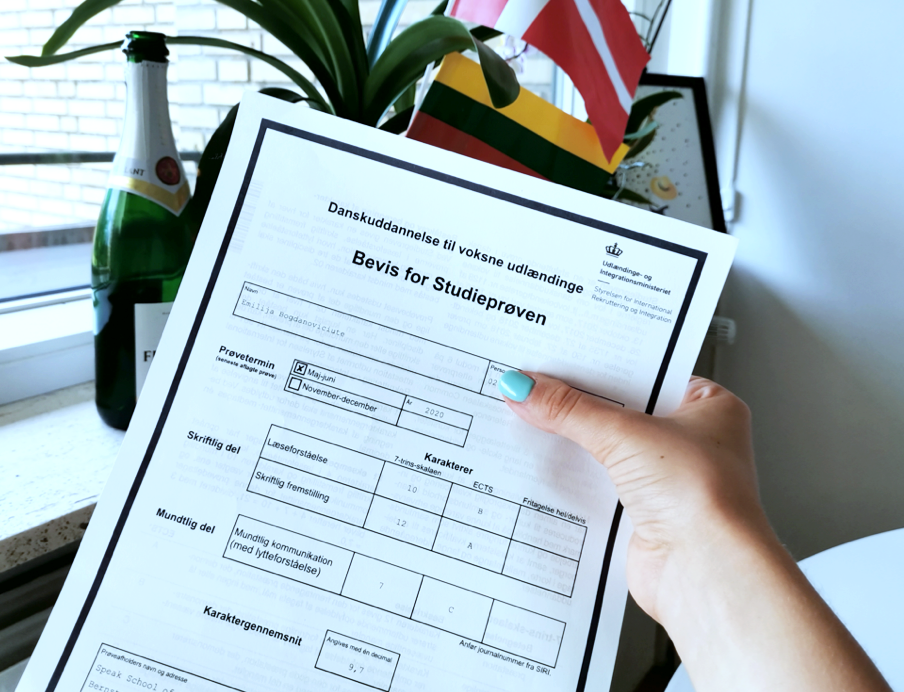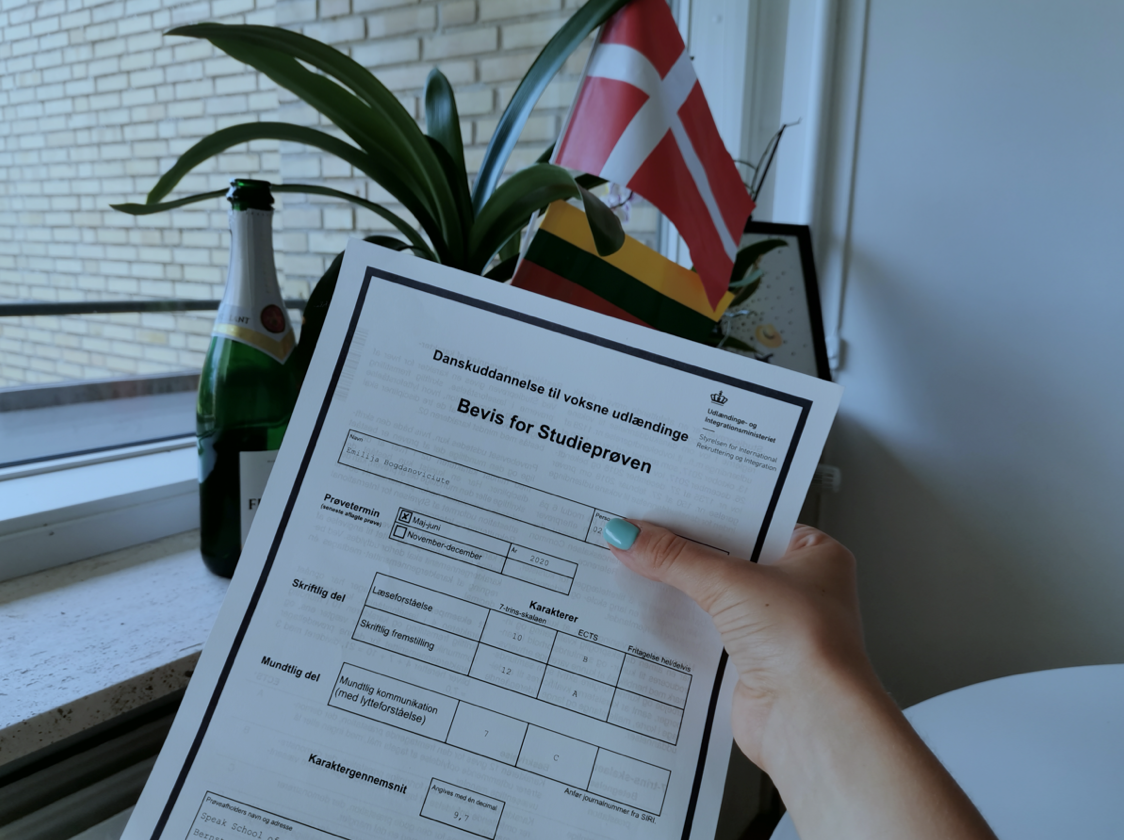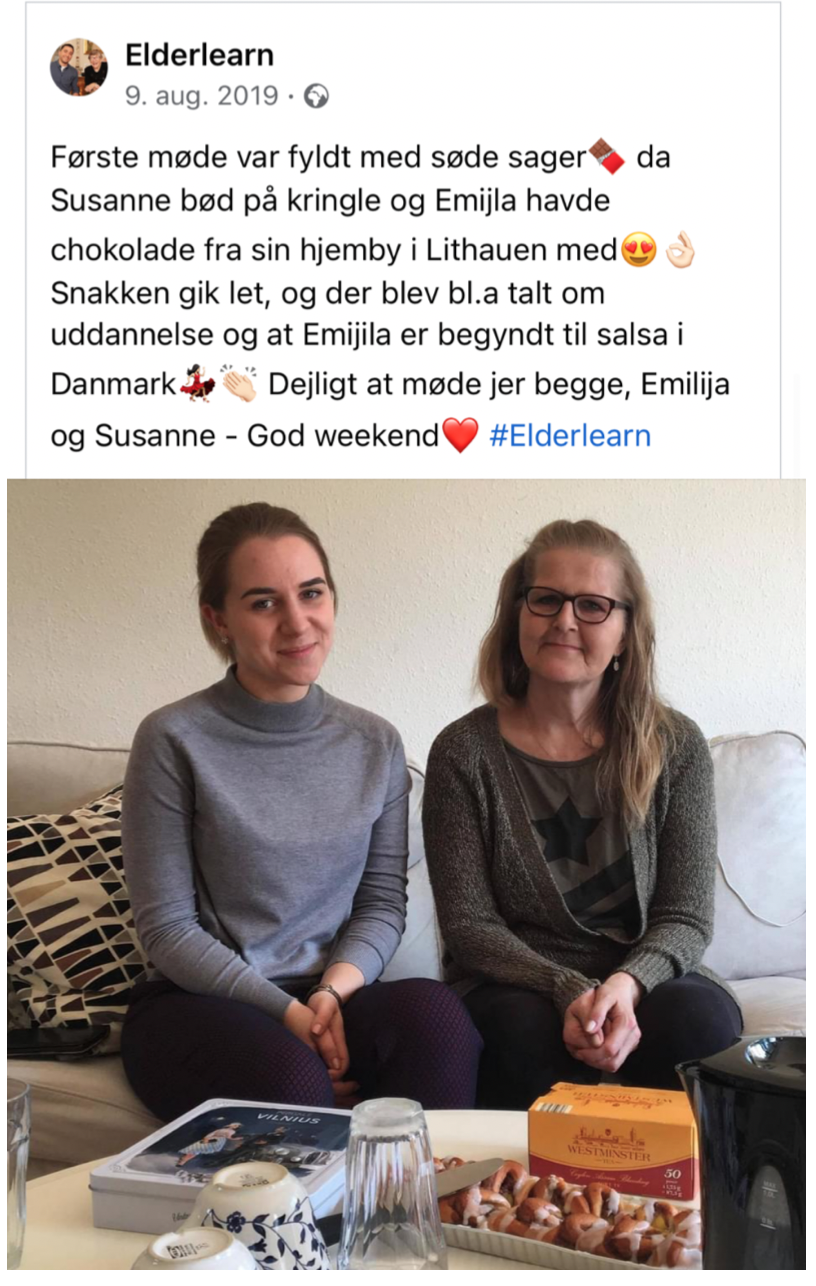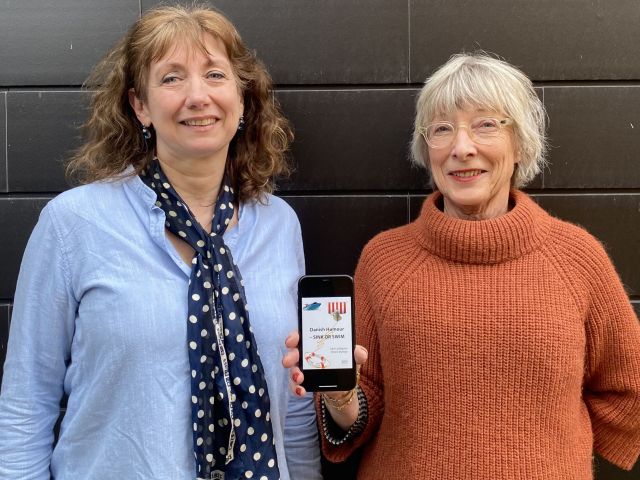Don’t switch to English and be patient: 10 tips for learning Danish

It feels good to pass your Danish exam, according to blogger and CBS student Emilija Bogdanoviciute.
If anyone had told me four years ago that I would be studying accounting and auditing in Danish, I would have laughed – I originally came here to study Tourism & Hospitality for my bachelor’s degree in an international study programme, and I could only say ‘’hej’’ in Danish.
But here I am today, discussing accounting standards and tax laws in Danish on a daily basis.
You might want to ask me the same question I’ve heard many times from my international friends: “What is the secret recipe for learning Danish as fast as possible?” (Disclaimer: No, it’s not Duolingo, and yes, I still have an accent – many people have asked me if I am from the Faroe Islands, but I take that as a compliment).
In my experience, learning Danish is not as hard as many expats say – that’s why I am sharing my 10 best tips for learning Danish with you.
1) Be realistic
This only “soft” tip is the most important one. To learn Danish, as well as any other language, you NEED to sacrifice a lot of time on learning all those new words (well, maybe a bit less if you speak another Nordic language or are a language genius).
Most CBS students already struggle with finding the right balance between studies, work, social life and hobbies – and learning Danish just adds to the pile.
I hope you care about mental health as much as I do – that’s why you have to be realistic and need to find out what you will cut out of your current daily activities, otherwise you risk burning out from stress.
And hey, it’s completely OK to focus on your studies, career and social life. No matter the pressure (I know it is there), you don’t have to learn Danish now. Actually, you will have much more time when you graduate – that is something worth considering.
You can, of course, choose a slower learning pace, but that is a much less effective way of mastering a new language. The brain simply needs full focus.
In my opinion, go for it 100% or do it later when you have time for it without making too many sacrifices in your everyday life.
2) Join a language course – and do your homework!
Danish language courses have the power to motivate you to keep in shape, just like a gym membership. I have mainly attended courses offered at CBS campus and tried some other ones, and I definitely vouch for CBS courses.
The classmates were motivated, you can make new friends with common interests, and the location is convenient and saves you travelling time.
My best advice is to get some recommendations about the language school you choose by asking around, as some of them have a better reputation than others in terms of administration/cancellations etc.
I also highly recommend joining intensive summer courses – not only your brain will thank you for a constant intake of Danish, but it also means that you can relax a little bit more during the study year. And you will see results faster – that has motivated me a lot.

There is no point in attending courses if you do not prepare for the classes. Therefore, you should remember to spend the same amount of time studying at home as you will attending the actual classes.
If you have even more time to spare, you can, for example, try learning some new words on your own, practice irregular verbs, or watch Netflix (in Danish!) with subtitles to grasp the pronunciation.
Pro tip: You can watch the same episode twice, the first time actively pausing the episode, noting down new words and rewinding to doublecheck what has been said; and the second time just relaxing and watching the show as you will suddenly understand much more!
I got the sweetest colleagues ever, who were so supportive and not that good at English either, and it improved my Danish a lot
Emilija Bogdanoviciute, Accounting student at CBS
3) Speak, speak, speak
It is really important that you try speaking Danish as much as humanly possible. At classes, outside classes, when you speak to the cashier at the supermarket, when helping a stranger at a train station get directions – you name it.
I’ll be honest here – no one cares about your grades from Module 1 or 2. People around you (including hiring managers reading your CV, where you’ve stated that you know some Danish), can only see your achievement when you are able to actually engage in a conversation in Danish.
Remember that this is the main goal when doing your homework for a Danish class. Have you just filled in the missing words in the dialogue, or have you picked up some good phrases you can use in conversations?
4) Join a Danish-speaking community
If you are a beginner and not that confident (yet!), join a Danes-only football club or engage in conversation lasting longer than one minute with your Danish classmates. I have some golden tips for you.
Elderlearn is a great Danish start-up that matches language students with retired Danes in your neighbourhood. I can recommend it.
Elderly people are usually more patient with mistakes, and it is just an amazing way of immersing yourself in the Danish culture and sometimes even making friends for life.
Some of them don’t know English that well, which is even better, since you can’t cheat and switch to English.

You can also join the Swap-language community or the Danish language bar in Lille Fortun in Lyngby, which organise regular language meetups with Danish volunteers ready to help you to get out of your comfort zone and just start speaking.
If you google a bit, I am sure you can find even more events happening in Copenhagen. And, of course, as soon as you feel that you understand some of the Danish words around you, consider joining a Danish sports/art – or any club, based on your interests.
5) Study job at a Danish company
This one is quite hardcore, but if your dream job does not involve working as an international strategist at a huge corporation firm, consider joining a smaller, less prestigious Danish company for a study job.
For me, it was completely unintentional when I joined an accounting department, where I realised I was the only foreigner. I got the sweetest colleagues ever, who were so supportive and not that good at English either, and it improved my Danish a lot

6) Go to museums
Most of the museums have exhibit descriptions in both Danish and English – I can’t think of a better way to learn a thousand new words (without even opening Google Translate). And you get to learn about Danish history, culture and art at the same time.

It’s also a great leisure activity to do with fellow students from your Danish class or other friends studying Danish. Many places are worth a day trip to visit a museum, e.g. Roskilde or Helsingør.
7) Focus on your pronunciation – better too early than too late
After one month of studying Danish, I was very close to giving up on the Danish ‘’R’’ and had no idea how the same letter can be pronounced in five different ways.
I realised that memorising all of the words with the right pronunciation is not the most sustainable way of learning. So, I joined a short course where we focused exclusively on pronunciation.
It can get quite theoretical, but it can really help to create some structure in your head on how to approach Danish words and speed up your learning journey.
8) Remember that learning material is available for you 24/7
Reading and translating labels on food packaging when doing grocery shopping, reading newspapers in the S- train, listening to Danish music (additional perk: life-long respect from your fellow Danish classmates at asemester-end party, where you show your skills singing along to Nik & Jay), you name it.
One thing that has really worked for me is to make a screenshot from Google Translate every time I translate Danish into English and then move all those pictures to a separate folder on my phone.
Every time you feel like scrolling through Instagram, you have an alternative – you can scroll through your saved screenshots of Danish words
Working as waitress, I asked my Danish colleague where I could find ‘luder’ (hooker) instead of ‘klude’ (cloths)
Emilija Bogdanoviciute, Accounting student at CBS
9) It’s YOUR goal – so don’t switch to English
I have heard this one so many times – fellow expats complaining that when they try to speak Danish to their colleagues or roommates, they instantly switch to speaking English.
Well, it is your goal to learn Danish, and even though it sucks that not everyone is super helpful, it is YOU who needs to be persistent and keep speaking Danish.
In 99.99% of all situations, Danes do not want to undermine your effort and they do not really think about it. It is simply easier to switch to English.
I have two strategies for this issue: 1) Keep talking Danish even if they reply in English, or 2) Simply tell the people you are talking to that speaking Danish means a lot to you and you need their help by keeping a Danish dialogue going.
If your Danish is not that good yet, you can try asking your colleagues etc. if they are OK speaking Danish with you for five minutes, every second day. Just don’t give up (and, of course, don’t do it with your boss if you are super busy at work or in a similar situation).
Pro tip: If you want to ask a fellow Dane how their weekend was or something similar, rehearse the sentence in your head before approaching the person. That has helped me not to switch to English at the very last second.
10) Embrace your imperfection – and celebrate every milestone
Quite a lot of students, especially at CBS, strive to be perfect. They want good grades, prestigious study jobs and so on.
Well, even if you are one of those students, I can assure you that your efforts to speak Danish will be far from perfect from the beginning and may even result in some awkward moments, such as me, working as I waitress, asking my Danish colleague where I can find ‘luder’ (hooker) instead of ‘klude’ (cloths).
Try learning new words on your own, practice irregular verbs, or watch Netflix in Danish with subtitles to grasp the pronunciation
Emilija Bogdanoviciute, Accounting student at CBS
Or the constant feeling that you have super-intellectual thoughts or charming jokes in your head, but they never turn out as intended. The only way is to embrace those moments because there is no way out of these situations.
Try to apply any motivational technique that works for you, such as giving yourself a small gift every time you really step out of your comfort zone or having the weekend off without even thinking of the Danish language after you have completed all your weekly Danish goals.
And, of course, celebrate all your milestones!








































































































































As a teacher, I really appreciate no. 7: “Focus on your pronunciation – better too early than too late” – oh my, the work it takes later on, if people don’t focus on pronunciation early on…
And it is fairly easy, really:
1. TRUST YOUR EARS, not your eyes. There’s quite a difference between writing and speaking, so if you want to SPEAK Danish, please trust what you hear, rather than what you read.
2. Have a teacher help you with whatever sounds causing you trouble. If necessary, try a different teacher, as different teachers have different approaches. Find an approach, that works for you.
All my best – god arbejdslyst 😉
What wonderful advice you give 🙂